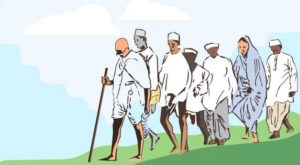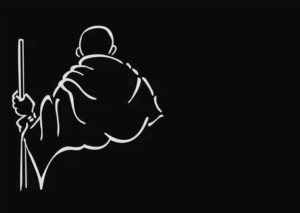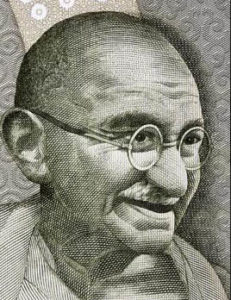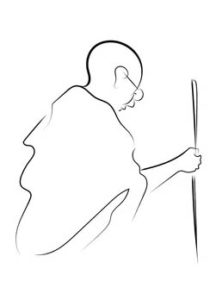By Omar Luther King
 In the evening of that fateful day, January 30, 1948, as the Maghrib (Muslims’ evening prayer time) was just over, people from the Congress House came running breathlessly to my father (he was then Assam Congress President) to unfold the bolt-from-the-blue tragic news of the assassination of Bapu in the inter-religious prayer meeting at Birla House!
In the evening of that fateful day, January 30, 1948, as the Maghrib (Muslims’ evening prayer time) was just over, people from the Congress House came running breathlessly to my father (he was then Assam Congress President) to unfold the bolt-from-the-blue tragic news of the assassination of Bapu in the inter-religious prayer meeting at Birla House!
That afternoon Bapu was unavoidably a few minutes late in coming to the prayer meeting. As soon as he came up, notwithstanding the nonchalant Home Department of Sardar Patel, the assassin emerged from his hellish abode and yelled, ‘You are late’. Bapu said, ‘Yes’, just to get bullets. The second pierced Bapu’s breast, and bleeding he fell with these last two words: ‘Hey Ram’. All was over soon.
In the year 1948, on the eve of the Birla House tragedy of January, Bapu took a fast-unto-death vow of Satyagraha on the inter-communal issue. Organised militant Hindu reaction that raised its head in ugly hellish form under the bad auspices of the RSS (Rashtriya Swayamsevak Sangh), as a fanatical counterblast to the gangster-cry of Mar ke lenge Pakistan; Lar ke lenge Pakistan! (We will kill and take Pakistan; We will fight and take Pakistan!), was then fast dragging the new-born nation down the precipice into the vile abyss of ‘communalism’. The vow, in Bapu’s own language was: With my life I will resist that devil-dance of self-annihilation!
 The Two-Nation theory had no sanction in the religion that Gandhi professed or, for that matter, in Christianity. It was a doctrine of violence born of distrust of man in place of peace born of trusting God; of anger, hatred and revenge born of frustration, in place of joy and love that come from the Prince of Peace – a denial of the life-work of our Lord and Saviour Jesus Christ.
The Two-Nation theory had no sanction in the religion that Gandhi professed or, for that matter, in Christianity. It was a doctrine of violence born of distrust of man in place of peace born of trusting God; of anger, hatred and revenge born of frustration, in place of joy and love that come from the Prince of Peace – a denial of the life-work of our Lord and Saviour Jesus Christ.
Amidst the encircling gloom, Gandhi’s fasting was a quest for light. Bapu began this last fast of his life as the Muslims’ Enemy Number One and broke the fast soon after as the Friend Number One of the Muslims in agony! The great work done in Noakhali and Bihar hit by communal (Hindu-Muslim) carnage at last bore fruit in abundance.
After some time when incensed with later-day communalism, some fanatical Muslims were maliciously calling Gandhi the Enemy Number One of Islam. The big brother Shaukat Ali who in the Non-Co-operation days, was often priding himself by saying that he could carry his Gandhi in the pocket, once sharply questioned Gandhi, ‘Why I miss you in my pocket now?’ Gandhi, in his characteristic way, at once retorted thus: ‘Make a diligent search and you will still find me in your pocket!’ Bapu had always remained the Muslims’ friend, notwithstanding.
 ‘If only non-Muslim India were with me’ Gandhi affirmed, `I could show the way to undo the proposed Partition’. But non-Muslim India had deserted him. In mass civil resistance leadership is essential. We chose Gandhi as our leader and made him the Father of the Nation. However, in individual civil resistance, every resister is his own leader and as one such leader, he chose to unite the two major religious (Hindu-Muslim) communities, and in that attempt, he had to sacrifice his life Christ like, manifesting Christ’s Spirit of love. The government of India, as of every other country, is upon the shoulder of God, and so, God’s will be done in India as in every other country, even in our undoing.
‘If only non-Muslim India were with me’ Gandhi affirmed, `I could show the way to undo the proposed Partition’. But non-Muslim India had deserted him. In mass civil resistance leadership is essential. We chose Gandhi as our leader and made him the Father of the Nation. However, in individual civil resistance, every resister is his own leader and as one such leader, he chose to unite the two major religious (Hindu-Muslim) communities, and in that attempt, he had to sacrifice his life Christ like, manifesting Christ’s Spirit of love. The government of India, as of every other country, is upon the shoulder of God, and so, God’s will be done in India as in every other country, even in our undoing.
Alas, Bapu was branded as the Archenemy of ‘Hinduism’ – of course, the ‘Hinduism’ of the RSS brand, G.M.G. – Gandhi Must Go. Hence the mad Birla House assassination at the hands of the base assassin, Vinayak Nathuram Godse. Gandhi’s seriousness in wanting to be like Christ put him in circumstances where his one and only choice was to imitate Christ and ‘die for his friends’.
It was ‘inevitable’ that Bapu should go. “Why grieve over the inevitable? And death is the common measure of all that lives. Imagine the torture that birth would be if there was no death! Loss, therefore, is a conventional word. Then true friendship is tested by the death of the loved one. Let Him take what He has given. Let us then praise His great name.”
 All that Bapu wrote in his letter to my father, Maulana M. Tayyebulla, on the death of my mother, Begum Afroza Tayyebulla (nee Hazarika of Puranigudam, Nowgong) applied to Gandhi as well. By the death of our beloved Bapu, ‘true friendship’ the world bore to him was indeed ‘tested finally’. Did not everybody from every nook and corner of the world realise Bapu’s message of non-violence? Did not the whole planet, as it were, pour forth its soul at the passing away of Gandhi? Gandhi, the Shaheed (martyr) of non-violence, by his death lives in the hearts of his people.
All that Bapu wrote in his letter to my father, Maulana M. Tayyebulla, on the death of my mother, Begum Afroza Tayyebulla (nee Hazarika of Puranigudam, Nowgong) applied to Gandhi as well. By the death of our beloved Bapu, ‘true friendship’ the world bore to him was indeed ‘tested finally’. Did not everybody from every nook and corner of the world realise Bapu’s message of non-violence? Did not the whole planet, as it were, pour forth its soul at the passing away of Gandhi? Gandhi, the Shaheed (martyr) of non-violence, by his death lives in the hearts of his people.
By non-violence, Gandhi emancipated India from bondage to freedom. Lo and behold, how the British Viceroy, the Lord Louis Mountbatten, coming soon after the Churchillian Viceroy, the Lord Linlithgow, had become independent India’s own Quit India Governor General! Did not Louis quit the shores of India as India’s best friend in the whole of the United Kingdom? What a miracle! Non-violent Means have Non-violent End.
Here let me add one word about ‘Means and End’. The Non-violent revolution that the Indian National Congress initiated in 1920, under the great leadership of Mahatma Gandhi – a unique new experiment in history – against British Imperialism, ended non-violently on the epoch-making historic day of Indian Independence, August 15, 1947. The known Western philosophy of Means and End (with apologies to Huxley) is belied by the Gandhian philosophy of Non-violence, wherein Means and End are one and the same concept.
As night follows the day, Non-violent Revolution – the Means – led to the Non-violent Quit India, the End! This is Gandhian doctrine, having its root in Christ’s Law of Love. Indeed, Non-violence of Gandhi bridged the wide gulf between India and Britain, and brought the two great countries closer as never before. This is the legacy of Gandhi, a triumph of Christ’s Love, known to the non-Christian world as Non-violence.
Let me conclude here with the kind words of Reverend J.H. Holmes of the United States of America. Referring to Gandhi as ‘the great prophet’, this is what he wrote: ‘I ought to say that we have gone very far wrong in our western civilisation. We have gone too far in the pursuit of wealth and power. It is a deep evil in our whole western civilisation. Our love of wealth has resulted in its concentration; our longing for power has brought on war after war and will very likely plunge us in future wars until civilisation is destroyed. So we gladly look to you (Indians) who are indicating another and better way, and we hope that while keeping the good things in nature and inventions, we should follow the brotherly spirit represented by the great prophet among you’.
(The author is a Delhi based writer and contributor at The Shillong Times)



